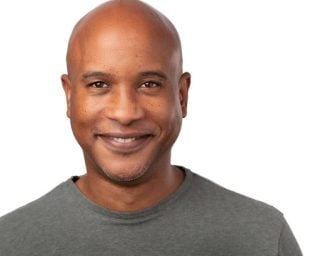5 Black Financial Influencers to Follow in 2024
These experts share gems about budgeting, money mistakes, side gigs and more.

Many, or all, of the products featured on this page are from our advertising partners who compensate us when you take certain actions on our website or click to take an action on their website. However, this does not influence our evaluations. Our opinions are our own. Here is a list of our partners and here's how we make money.
The investing information provided on this page is for educational purposes only. NerdWallet, Inc. does not offer advisory or brokerage services, nor does it recommend or advise investors to buy or sell particular stocks, securities or other investments.
A 2023 Pew Research study of Black Americans found that 68% of Black adults don’t feel they have enough income to live the life they want. Ready for the brighter side? The study found that despite not having enough now, 58% of Black adults are optimistic that they’ll get there.
Another point for the brighter side is that there are many Black financial influencers working to help people live the lives they want. Within their respective fields, they're helping bridge the gap by sharing personal finance knowledge, leading important conversations and empowering people along the way.
We asked influencers who are doing impactful work some questions about budgeting, money mistakes, financial education on social media, and side gigs. Here’s what they had to say.
Meet MoneyNerd, your weekly news decoder
So much news. So little time. NerdWallet's new weekly newsletter makes sense of the headlines that affect your wallet.
Responses have been edited for length and clarity. Learn more about each financial pro following the questions.
Sticking to a budget can be tough. What are your best tips for staying on budget?

Trae Bodge (expert on smart shopping and saving money): Like with so many commitments we make (diet and exercise come to mind), we neglect to come to terms with what is truly doable and end up attempting something that is ultimately not sustainable.
As a starting point, identifying wants versus needs, spending traps, goals and aspirations — as well as what’s really important to you — can be very helpful, especially if you are in a partnership.

Rahkim Sabree (financial therapist and author): Make sure that the numbers match your values. Many people approach budgeting like a fad diet. If your financial goals don't align to your values, or you're setting goals because you think that's the right thing to do, you'll likely not stick to it. Account for periods of enjoyment and milestone rewards in your budget that give you an incentive to keep going — and no, you don't have to give up coffee. Just plan for it.

Ericka Young (co-host of the “For Better & Worth” podcast with husband Chris): Disconnect your debit and credit cards from shopping apps to minimize unnecessary purchases. Unsubscribing from email lists will reduce the temptation to shop too.
Give yourself time to improve your budgeting skills. Budgeting is a learning process and may take a few months to fully grasp and implement effectively.

Yemi Rose (founder and CEO of OfColor, a financial wellness platform for employees of color): Recognize that a setback … doesn't mean the entire effort has failed or is over. The emotional letdown from going slightly over budget can actually make us keep spending if we view our budget as “already busted.” You have to give yourself grace and recognize that establishing and sticking to a budget is not a single decision you make and then store it away in the brain. It's dozens of small choices that we make every day. Impulse purchases happen, and a single slip-up is just that.
What's a money mistake you recently made? What did you learn from it?
Yemi Rose: I've found apps like Cash App and Venmo to be very useful. … However, I recently fell into the trap of not monitoring my account balances carefully enough and allowing payments that came in to accumulate. That cash balance was not accruing any interest or working for me at all.
Now, I have friends who see that accumulating balance as a kind of forced savings mechanism — like overpaying a bit on taxes and then getting a lump sum back later on via a tax return. But there are some really attractive rates out there right now, so letting my balances accumulate was practically turning down “free” money that I could have been earning through interest payments.
Ericka Young: When we moved into our home, we assumed the payments on a soft water system. We have been renting it ever since. If we had made it a priority to purchase a system immediately, it would have cost us a lot less than the payments we have made over time. We learned that most of the time it costs you significantly less to purchase a large item than to rent or lease it.
Rahkim Sabree: Social media has given people greater access to financial concepts, tools and terms. This is a double-edged sword, however, as oftentimes licensed financial professionals are limited in what they can share due to compliance regulations. This creates an opportunity for individuals with no financial training and background to spread misinformation and place products or services in front of their audiences that may be harmful.

Malcolm Ethridge (author, executive vice president at CIC Wealth): With so many different platforms and so many varying opinions out there, social media has made it tougher for people to tell the difference between quality financial advice and noise. However, by doing a quick Google search and reviewing a person’s background, credentials and online reviews, it becomes a little easier to discern who is simply trying to sell a product and who is sharing an informed opinion.
Yemi Rose: Because of our work, we hear all of the money myths that catch fire online, especially within specific cultural spaces. … The medium is so rich. You are seeing, hearing, or reading content made for fast and easy consumption. You're more likely to remember it. Obvious scams are thought to be true because they may be connected to personalities that feel familiar, even if you don't know them.
Black people in America have been taken advantage of so often by financial systems that were not built for us that we have a natural confirmation bias towards things that are outside of that system or against that system. And so crypto scams resonate more, outrageous claims about free money opportunities do well. Think about how hard it must be to resist: You lack generational wealth and see peers flexing every day on Insta, and you get hit with an offer or opportunity to generate even a little bit more wealth from a new (read: untested and unproven) financial vehicle.
What's your best advice for taking on a side gig?
Yemi Rose: I hate that we have romanticized the "side gig" so much. It's a symptom of a system that’s not working for a great many people, and people of color are far more likely to do gig work.
Anyone taking on a side gig should [have] clarity on what they are getting and giving up. If they are gigging for the money, then there's an anticipated future where their working hours will normalize, and they bring in more per hour than whatever they are doing now. Or better yet, they grow a business of their own. But be clear on the physical and emotional toll that working extended hours can have on a person.
Trae Bodge: Side gigs can be lucrative or disappointing, so have realistic expectations. … Thoroughly research the pros and cons of the side gigs you are interested in, especially those that require any investment or time commitment upfront. Ask around, read reviews, message groups, etc., before jumping in.
Ericka Young: Find seasonal employment opportunities. Sometimes these short windows of time turn into long-term employment opportunities. Identify your skills and areas of expertise to make your search easier and more relevant. Pursue activities you genuinely enjoy to make the most of your free time and minimize stressful work.
Malcolm Ethridge: For those who are in the fortunate position where they don’t actually need the additional income to cover their expenses each month, having a side gig creates an awesome opportunity to bolster your savings and potentially get you to financial independence earlier than age 65. There are also significant tax benefits that can be enjoyed, such as deductions related to expenses … and solo 401(k) plans, which have contribution limits significantly higher than you’re allowed inside your workplace retirement plan.
More about the influencers
Trae Bodge: TrueTrae
Bodge, a lifestyle journalist and TV commentator, specializes in saving money and shopping smart. She is regularly quoted in publications and has appeared on-air more than 1,000 times, including on “Good Morning America,” “Today” and “NBC Nightly News.”
Instagram: @truetrae
Facebook: @truetrae
Malcolm Ethridge: Malcolm Ethridge
Ethridge is a writer, speaker and an executive vice president at CIC Wealth. At CIC, he leads a team creating customized financial plans addressing some of the most complex financial situations working professionals face.
LinkedIn: Malcolm Ethridge
Yemi Rose: OfColor
Rose is the founder and CEO of OfColor, a financial wellness platform focused on the empowerment of employees of color and a Financial Finesse Ventures portfolio company. The platform blends fintech with culturally relevant content, financial coaching and therapy.
LinkedIn: Yemi Rose
X (Twitter): @YemiRose
Rahkim Sabree: Rahkim Sabree
Sabree is a financial therapist, accredited financial counselor and award-winning thought leader on financial trauma. He's the author of several books, a Forbes columnist and founder of the Overcoming Financial Trauma newsletter.
Instagram: @RahkimSabree
Ericka Young: For Better & Worth
Ericka and husband Chris co-host the award-winning podcast For Better & Worth. Each week, they discuss how to talk money with your honey. They believe you don’t have to sacrifice your relationship while building your net worth.
Instagram: @forbetterandworth
Article sources
NerdWallet writers are subject matter authorities who use primary,
trustworthy sources to inform their work, including peer-reviewed
studies, government websites, academic research and interviews with
industry experts. All content is fact-checked for accuracy, timeliness
and relevance. You can learn more about NerdWallet's high
standards for journalism by reading our
editorial guidelines.
Related articles









